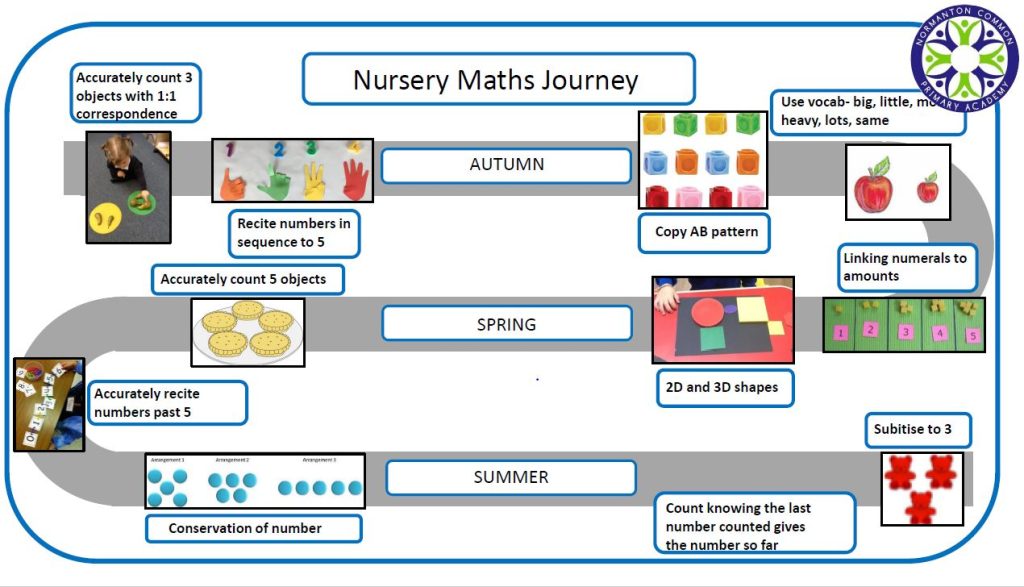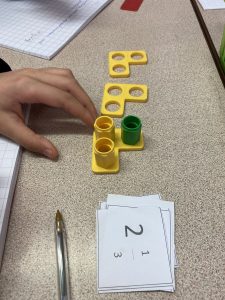Subject Leader : Luke Oldroyd
‘Mathematics should equip children with the strategies, knowledge and language to help them to understand and make sense of the world around them. Mathematics is integral in everyday life and with this in mind we endeavour to ensure that our children develop a healthy and enthusiastic attitude towards maths that will stay with them and make them confident lifelong learners’.
Mathematics consists of a whole network of concepts and relationships, which children learn to use to communicate and to tackle a range of practical tasks and real life problems. Our aim is that all of our children become independent learners, who can apply logical reasoning, problem solving skills and the ability to think in abstract ways. Mathematics teaching and learning at Normanton Common, is not confined to ‘Maths lessons’, instead links are established across a range of subject areas to support the understanding that Maths is real!
Our approach to the curriculum in mathematics is based upon a language rich, active learning experience. We believe that children learn best if they are exposed to new concepts with hands on practice and immersion in new technical vocabulary. Our children are taught mathematical knowledge through the support of concrete resources, pictorial representations and approaches that are more abstract. We ensure that they have a firm grasp of the four key calculations, (addition, subtraction, division and multiplication), so that by year 6 children are confident with abstract learning and problem solving.
In Maths pupils will have the opportunity to:
- Become an independent learner.
- Work with concrete, pictorial and abstract methods.
- Learn through a language, rich active learning experience.
- Apply their skills to logical reasoning and problem solving.
- Link their skills in maths across the curriculum.
How is the content / theme chosen?
The content is chosen to make effective links with key themes and ensure coverage of the expectations as set out in the National Curriculum programmes of study, as well as the EYFS framework. At Normanton Common Primary Academy we ensure a clear, sequenced progression, which is taught systematically for all pupils to acquire the intended knowledge and skills. The content may be adapted or changed, based upon the needs or interests of specific cohorts.
Click on the link below to see an overview of our Maths Curriculum:

How do we ensure progression of knowledge and skills?
At Normanton Common Primary Academy we have in place, for each subject area, a knowledge and skills progression document, which is used for planning, to ensure sequenced and appropriate content for specific year groups. Teachers are clear on the learning and expectations for each year group, as this has been carefully selected and mapped out so that children are building on prior knowledge and skills each term and each year. Within these documents there are opportunities for differentiation (through a variation of scaffolding and differentiation of task), in order to meet the needs of all learners.
Maths lessons are carefully planned through our themes, so that valuable links can be made across other subjects. A long term rolling programme maps out the coverage of the discrete teaching and learning opportunities for children to develop and embed specific skills. This ensures coverage of the National Curriculum, for maths across Key Stage 1 and 2 and work within and beyond the Early Year’s Framework across our Foundation Stage.
Alongside this, we use the recently produced Department for Education materials, (Teaching Mathematics in Primary Schools Guidance, July 2020) and the White Rose Scheme for mathematics, to ensure that key learning and understanding has taken place by the end of a specific year group, ensuring children are then ready to extend and deepen their knowledge in subsequent years. Aside from these documents, teachers will plan activities and opportunities for consolidation, stretch and challenge, in order to meet the needs of all learners.
How is the subject taught?
Maths is taught through a mastery approach. Underpinning this pedagogy is the belief that all children can achieve in maths. Teaching for Mastery aims to provide all children with full access to the curriculum, enabling them to achieve confidence and competence – ‘mastery’ – in mathematics, rather than many failing to develop the maths skills they need for the future. Mathematics Mastery places emphasis on the cumulative mastery of essential knowledge and skills in mathematics. It embeds a deeper understanding of maths by utilising a concrete, pictorial, abstract approach so that pupils understand what they are doing rather than just learning to repeat routines without grasping what is happening. Our teaching of maths is underpinned through a concrete, pictorial and abstract approach where children can move backwards and forwards through the different stages depending on their journey.
Concrete
Children use practical equipment e.g. Numicon, counting bears and counters to gain a solid understanding of mathematical concepts, making links with new learning and developing analytical thinking for problem solving. Across school new concepts in mathematics are taught practically and in real contexts to support understanding and deepen learning.
Pictorial
Children replace concrete apparatus with a pictorial representation – essentially a drawing or picture which still provides them with a support to access their learning. This is sometimes used directly alongside the concrete resources to aid understanding.
Abstract
Children will use numbers and symbols and formal written methods, as well as developing their mental recall. At the point in which children are secure with their fluency in areas of the mathematics curriculum – their thinking is challenged and extended through open ended, high order questioning and problem solving activities, as well as variation in how problems and questions are presented.
Key stage 2 have additional daily arithmetic and x tables practice to ensure key skills and concepts are regularly revisited. Our Key Stage one children are exposed to a robust ‘mastering number’ programme that runs as an extra to their maths lesson. First class @Number is used as a targeted intervention in Year 3, this is a short 12 week intervention for 6 children at a time which has enabled children entering Key Stage 2 to catch up and keep up.
There is a strong focus on developing the Mathematical vocabulary of our children and retention of this through practical learning opportunities. New vocabulary is taught, with the emphasis on key mathematical words and phrases . Although we actively introduce and are ambitious with the language we use, we understand the importance not to over complicate this language with very young children, but ensure underlying principles and meanings of the words are taught and understood. Children are introduced to and reminded of key vocabulary. Questioning is used to check their understanding and prior knowledge, before new concepts, skills or knowledge are introduced.
Modelling is used by class teachers to clarify expectations, children are then given plentiful opportunities to consolidate, build upon and apply basic skills in through fluency practise (including variation in questions and activities). The teacher skilfully removes any scaffolds, which have supported the children’s initial understanding, when they are ready, before ensuring time for independent practise.
Children are taught how to reason and this becomes an expectation throughout their mathematics learning. Problem solving opportunities are interwoven throughout mathematics lessons, as well as other daily opportunities, so that children can apply the knowledge and skills that they have learnt.
Pupils also have additional opportunities to extend their mathematical knowledge and skills through cross-curricular work. Strong links with other subject areas, particularly Science and PE ensure that children have numerous opportunities to apply skills across the curriculum. Opportunities to learn about significant people, including famous mathematicians are carefully chosen, so that children are continually developing the sense of the importance of maths in the wider world. This learning also strengthens the links between science and history.
Teaching Maths in EYFS
There is strong subject knowledge in EYFS, where children spend time exploring, acquiring and reinforcing the basic concepts, before being offered challenging opportunities to work beyond the early learning goals. Our intent for mathematics in the early years is that children have a deep understanding of the number system, first to 5 and then to 10 in order to prepare them for Key Stage 1.
We have an EYFS curriculum that moves from practical concrete opportunities into pictorial and abstract calculations when children are ready for this. Children are exposed early on to key concepts such as place value and number bonds, so that they have a good basis from which to work in Key Stage 1.
Maths is taught daily as part of a focussed, discrete teaching activity in EYFS through a robust ‘mastering number’ programme. Children are then provided with learning activities based upon this teaching, so that they can refine and develop their knowledge and start to apply their skills. In addition to this, opportunities for mathematics teaching and learning are developed through the routines of the school day, e.g. counting how many children are here today. Mathematics challenges, as well as opportunities to apply skills and embed knowledge, are carefully planned for through the areas of provision in both the indoor and outdoor learning environments.
How do we know that our children are making progress?
Ongoing assessments of the children’s knowledge and skills is observed by the class teacher. Misconceptions are addressed and next steps carefully planned. Children’s outcomes are compared to the subject specific skills and knowledge documents. At the end of a block of discrete teaching (or term) subject leaders gather an overview of children’s outcomes in each subject area. This is used to plan appropriate next steps for their future learning, as well as provide an overview of learning within a subject area across the whole school. End of year assessments are collated for children at the end of EYFS and Key Stage 1.
How do we promote our Curriculum Intent?
Active Learners
During maths children will have the opportunity to both participate in a range of activities both independently and collaboratively. This will provide them with the necessary tools to be about to improve their independence, teamwork and communication. Throughout units of maths, children will be exposed to both reasoning and problem solving questions. This results in children developing resilience as they will have to persevere before they get the correct answer. Within school, we have a variety of challenges (TT rock stars) that the children participate in. This ensures the children are ambitious and want to be the very best for themselves. Subsequently, the children will have increased pride within their work and in themselves.
Active Communicators
Normanton Common is a language rich school. In maths, children will be exposed to a wide range of vocabulary throughout every lesson. Lots of the vocabulary used is tranferrable to other areas of the curriculum. As maths is a very factual subject, the terminology the children are exposed to promotes that love of language and vocabulary as children are consistently emersed within new language and concepts throughout their whole school life. Children will have the opportunity to use their oracy skills to provide feedback and evaluate their own and others’ questioning and work.
What wider opportunities are provided for our children?
Children have the opportunity to participate within whole school, class and independent competitions that run throughout the year in Times Table Rockstars. The children also have the opportunity to participate within Waterton Academy Trust maths challenges.
Maths in action...

